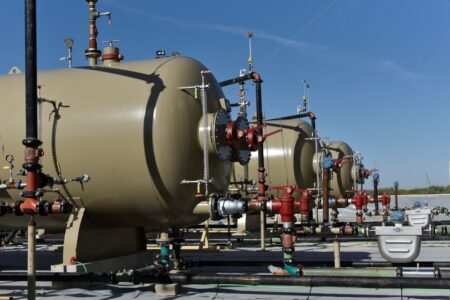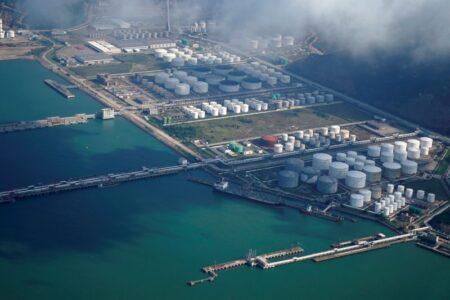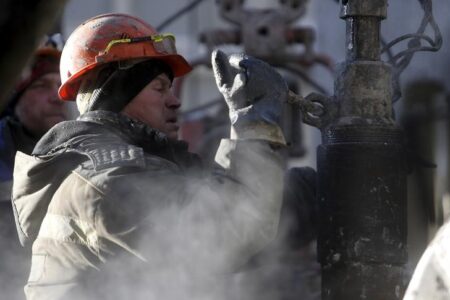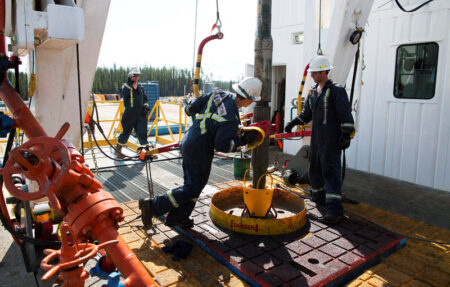Investing.com – Crude prices fell Tuesday after a one-day rebound as traders hit the pause button on the market’s advance to better assess the impact from the Israel-Hamas war.
New York-traded West Texas Intermediate, or , crude for delivery in November settled down 41 cents, or 0.5%, at $85.97 per barrel.
London-traded for the most-active December contract settled down 50 cents, or 0.6%, at $87.81.
Both WTI, the US crude benchmark, and its UK peer Brent rose just over 4% on Monday with markets on red alert over fears of political and economic contagion from the fighting in the wake of the surprise attack by Hamas militants on Israel over the weekend
But 24 hours later, markets appeared to have calmed, with a risk-on fervor pushing up stocks on Wall Street.
Crude prices, meanwhile, dipped in the absence of credible estimates on how many barrels of oil produced, traded or shipped out of the Middle East would be stranded by newest tensions in the region.
No word of clampdown on Iranian oil
Since late 2022, Washington has turned a blind eye to surging Iranian oil exports, bypassing American sanctions. The priority in Washington was an informal détente with Tehran so as to allow the world more oil supply in the advent of OPEC+ production cuts.
As a result, Iranian crude output is estimated to have surged nearly 700,000 barrels a day this year – the second-largest source of incremental supply in 2023, behind only US shale oil.
Now, as reprisal for Tehran’s involvement, the United States could turn its full attention again towards enforcing the sanctions on Iran and that would be positive for crude prices, analysts said.
But as of Tuesday, there was no word yet of a clampdown on Iranian oil.
“Crude prices are lower as profit-taking settled in after it was clear a fresh catalyst was needed to take prices above the $90 a barrel level,” said Ed Moya, analyst at online trading platform OANDA. “Energy traders will have lots of time to assess how the Israel-Hamas conflict impacts Saudi production, if Iranian crude will face sanctions, and if other OPEC+ members will pick up their production levels.”
Energy analysts at ING had a similar view.
“There is still plenty of uncertainty across markets following the attacks in Israel over the weekend,” said ING analysts, in a note.
“If reports of Iran’s involvement turn out to be true, this would provide another boost to prices, as we would expect to see the U.S. enforcing oil sanctions against Iran more strictly. That would further tighten an already tight market.”
There should be no “free lunch” helping oil rally
It was also important to put the brakes on any oil rally to prevent the market from getting ahead of itself again, like it did in the third quarter — in spite of concerns about global inflation and stagnating European growth, said John Kilduff, a partner at New York energy hedge fund Again Capital.
Crude prices rose almost 30% between July and September, reaching more than one-year highs that took WTI above $95 and Brent to over $97.
“It’s alright to assign some geopolitical risk to oil in situations like this, but not to the extent that the geopolitical risk itself becomes a free lunch for the trade,” said Kilduff. “As of now, there’s no proof that there’ll be a meaningful reduction in barrels because of this war alone and that includes any clampdown on oil exports from Iran, which is a supporter of all things Hamas. Until and unless we get evidence of that, crude prices should not trade much higher than where they did last week.”
OPEC+ vows that cuts will continue
The downside in crude prices was, meanwhile, limited by Saudi Energy Minister Abdulaziz bin Salman’s pledge that output cuts by oil producers in the global alliance known as OPEC+ will continue.
The Saudis and Russians, who jointly lead the OPEC+, are withholding a daily supply of 1.3 million barrels between them, while the rest of the 23-nation alliance is contributing to a squeeze of another 2 million barrels or more.
“I honestly believe that the best thing I could say is that the cohesion of OPEC+ should not be challenged,” Abdulaziz said on the sidelines of a climate conference in Riyadh. “We’ve been through the worst, I don’t think we will have to go through any terrible situation at all,”
“Yes, we may be delayed with a decision on what to do, but I would not forfeit the precautionary approach, even if it goes beyond a month or two, or three or four months, or five months,” he added.
(Peter Nurse contributed to this article)
Read the full article here












